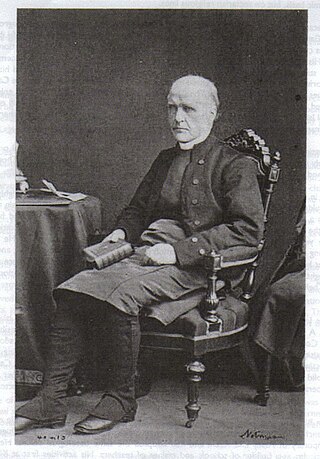
Henry Parry Liddon (1829–1890), usually cited as H. P. Liddon, was an English theologian. From 1870 to 1882, he was Dean Ireland's Professor of the Exegesis of Holy Scripture at the University of Oxford.

Charles Gore was a Church of England bishop, first of Worcester, then Birmingham, and finally of Oxford. He was one of the most influential Anglican theologians of the 19th century, helping reconcile the church to some aspects of biblical criticism and scientific discovery, while remaining Catholic in his interpretation of the faith and sacraments. Also known for his social action, Gore became an Anglican bishop and founded the monastic Community of the Resurrection as well as co-founded the Christian Social Union. He was the chaplain to Queen Victoria and King Edward VII.

Edward Feild was a university tutor, university examiner, Anglican clergyman, inspector of schools and second Bishop of Newfoundland.
David Staffurth Stancliffe is a retired Church of England bishop. He was Provost of Portsmouth Cathedral from 1982 to 1993, and the Bishop of Salisbury from 1993 to 2010. He is the third generation of his family to serve the ordained ministry.

Ripon College Cuddesdon (RCC) is a Church of England theological college in Cuddesdon, a village 5.5 miles (8.9 km) outside Oxford, England. The College trains men and women for ministry in the Church of England: stipendiary, non-stipendiary, local ordained and lay ministry, through a wide range of flexible full-time and part-time programmes.

Sarum College is a centre of theological learning in Salisbury, England. The college was established in 1995 and sits within the cathedral close on the north side of Salisbury Cathedral.
Philip Freeman (1818–1875) was a Church of England cleric and Archdeacon of Exeter.
Gerald Burton Allen (1885–1956) was a British scholar and a Church of England priest and bishop.
Humphrey Ivo John Southern is a British Anglican bishop. From 2007 to 2015, he was Bishop of Repton, a suffragan bishop in the Diocese of Derby. In April 2015 he was appointed Principal of Ripon College Cuddesdon, an Anglican theological college.
Rocksborough Remington Smith was a British Anglican bishop in the first half of the 20th century.
Alan Paul Jeans is a British Anglican priest. He has been the Archdeacon of Sarum, in the Church of England Diocese of Salisbury, since 2003.
The Church of Ireland Theological Institute is responsible for ministerial formation and lay training within the Church of Ireland. It is located in Churchtown in Dublin. The Church of Ireland, Representative Church Body (RCB) Library and archives, are also housed on the CITI Campus.

Andrew Chan Au-ming is the Archbishop of Hong Kong and Primate of Hong Kong Sheng Kung Hui since January 2021 and the Bishop of its Western Kowloon diocese since March 2012. He was ordained as deacon in 1991 and priest in 1992. He was priest-in-charge of Holy Spirit Church, vicar of St. Luke's Church and the first Chinese dean of St. John's Cathedral.
Noel Michael Roy Beasley is a British Church of England bishop and epidemiologist. Since June 2022, he has been the Bishop of Bath and Wells; he was enthroned and started active ministry in that role in November 2022. From May 2015 to June 2022, he was Bishop of Hertford, a suffragan bishop in the Diocese of St Albans. From 2003 to 2010, he worked at Westcott House, Cambridge, an Anglican theological college, first as chaplain and then as a tutor and the college's vice-principal. During this time, he was also an academic of Imperial College London. From 2010 to 2015, he was Director of Mission for the Diocese of Oxford.

Peter Andrew Eagles, is a British retired Anglican bishop. From 2017 to 2023, he was the Bishop of Sodor and Man; he was consecrated a bishop in the Church of England in June 2017, and he was installed in September 2017. He is a former chaplain of the British Army, serving as Archdeacon for the Army (2011–2017) and the Deputy Chaplain-General of the Royal Army Chaplains' Department (2014–2017).
Michael John Volland is a British Anglican bishop and academic, specialising in mission and practical theology. Since November 2023, he has been Bishop of Birmingham, the diocesan bishop of the Church of England's Diocese of Birmingham. From 2017 to 2023, he was Principal of Ridley Hall, Cambridge, an Anglican theological college in the Open Evangelical tradition. He was previously Director of Mission at Cranmer Hall, Durham, and Director of Context-based Training at Ridley Hall.
Bruce Duncan, is a retired Anglican priest, chaplain, and academic administrator. From 1995 to 2002, he was the first Principal of Sarum College, an ecumenical theological college in Salisbury, England.
Bertram Keir Cunningham,, also known as B. K. Cunningham, was a British Anglican priest and academic. From 1919 to 1943, he was Principal of Westcott House, Cambridge, a Church of England theological college.

Frederick Samuel Willoughby (1862-1928) was a Church of England priest, academic administrator and later Old Catholic bishop. While vicar of Hooton Pagnell, he founded and was first principal of St Chad's Hostel, which survives as St Chad's College, Durham.
St John's Theological College, Perth was an Australian educational institution in Perth Western Australia, established in 1899 and which closed in 1929. It trained candidates for ordination in the Church of England in Australia.









